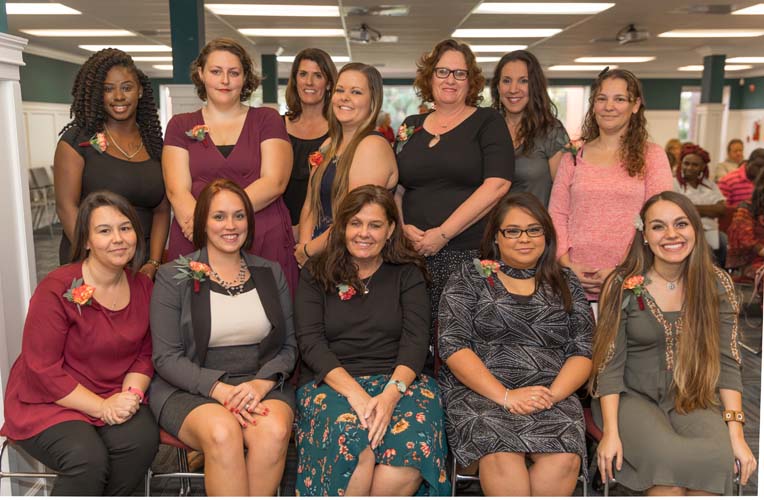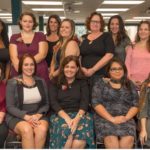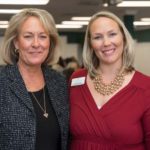
As their proud families, co-workers and friends looked on, 12 local preschool teachers were awarded their Florida Child Care Professional Credentials, becoming the first graduates of the Childcare Resources of Indian River Credentialing Program for Early Educators, a partnership with Indian River State College funded by a grant from Impact 100.
Understanding the critical need for quality early childhood education and secure in the knowledge that better-educated teachers produce children who are better prepared for kindergarten and beyond, the philanthropic women of Impact 100 awarded Childcare Resources a transformational $100,000 grant for the program this past spring.
Currently, more than 50 percent of Indian River County children are ill prepared when they enter kindergarten. Contributing to that dismal statistic is the fact that the Florida Department of Children and Families requires just 45 hours of online coursework to work as a preschool educator.
“You can be hired with zero credentials,” said Elizabeth Lappert, one of the CPEE program’s three IRSC professors. “The state gives you a full year to achieve the minimal of 45 hours that are available online and then you take the exams at the testing center.”
“So you do not even have to have a high school diploma or GED to work at a center. You don’t even have to speak English,” said Elizabeth Swann, CPEE program facilitator.
Compounding the problem, many preschool teachers who have met that state requirement are unable to advance their education and obtain their Florida Child Care Professional Credential because of the expense, time requirements and limited class access. IRSC primarily offers its early education classes at its main campus in Fort Pierce.
With the Childcare Resources program, enrollees are fast-tracked through 17-week, four-course sessions to meet the mandatory 120 hours of quality training and 480 children’s contact hours. The Impact 100 grant jumpstarted the project by funding tuition for the initial 36 students (three cohorts of 12 students each), enabling them with zero out-of-pocket expenses, to attain that next level credential.
The courses – Introduction to Child Development, Creative Experiences for Children, Principles of Early Childhood Curriculum, and Practicum – are taught by IRSC professors after hours and Saturdays at the Childcare Resources facility. Participants also attend professional development workshops and seminars, and have access to the highly accredited classrooms of the Childcare Resources School.
Having sought a diverse cross-section of teachers and preschool centers, their initial 12 enrollees possess varied backgrounds, education and experiences, and represent 10 different childcare centers throughout the county.
“In January we’ll get 12 new students and then the fall will be the third group,” said Lappert. There is already a wait list of 33 teachers interested in the fall 2018 semester.
“We go through a lengthy selection process for the instructors as well as the students,” said Swann. “We work with Sara Whitacre, who runs the FCCPC program at IRSC and we really vet these professors. We want to make sure we’re getting quality instructors; bringing that quality instruction to this area. It’s really changing the landscape of access to quality early childhood education in this area.”
The response from the students has been overwhelmingly positive.
Bianca Capozzi, a teacher at 20th Avenue Christian Learning Center, said she was surprised to learn the extent of the detailed planning needed for the successful education of her young charges, adding, “everything is so important to their development.”
“Everything we do has an impact on them, whether it be positive or negative,” agreed Amy Benevides, a teacher at Asbury United Methodist Church Academy (formerly Great Beginnings). “And you don’t think about it until you look at it through their eyes. Everything they do is a building block to a milestone.”
Both women have already shared what they have learned with their co-workers so that they might duplicate concepts in their own classrooms. All said they are also very appreciative of the support given them by the directors of their schools.
“They’ve been extremely supportive; I’m very grateful,” said Capozzi.
“Because this is such an intimate environment, because this is 12 individuals, because it’s 17 weeks long, this is a very safe environment to share stories,” said Swann. In addition to course study, she adds, “most of our learning is sharing. It’s huge, especially for somebody who’s just started, but also for someone who’s been in it for a long time and has an example for pretty much every scenario. So you have what we call community of practice.”
They anticipate sustaining future students through scholarship money, primarily the T.E.A.C.H. Early Childhood Scholarship Program.
“Impact really helped kick start this but we see it as a forever project,” said Swann. “When you have these long-term projects, you look at that long-term community impact as well as growth and development.”
“T.E.A.C.H. is a partnership with their employers,” Lappert explained. “When they enroll for courses, the government, or T.E.A.C.H., will pay a portion of their tuition and their employer will pay another percentage of their tuition. The same thing happens with their textbooks and they receive a small stipend.”
“When you think about the true empowerment aspect of this, yes, we’re getting everyone their FCCPC, but we’re really creating these pathways to long-term success,” said Swann. “We have Sara Whitacre coming to talk to them about continuing their education, where they can go from here.”
“Having this credential allows them to go from being the assistant to the lead teacher in the classroom, which could correlate to an increase in pay,” said Lappert. “If they want to get their AS degree, that would be the next step.”
For more information, visit childcareresourcesir.org.
Photos by: Denise Ritchie
Click HERE to see more or buy photos
- Wanda Lincoln, Pam Barefoot, Stephanie Herrera, and Carolyn Veeneman
- The first graduates of Childcare Resources of Indian River’s Credentialing Program for Early Educators.
- Casey Lunceford with Susan and James Donovan
- Sara Whitacre and Elizabeth Swann
- Stephanie Harmody, Shannon Bowman, and Bonnie Wilson








